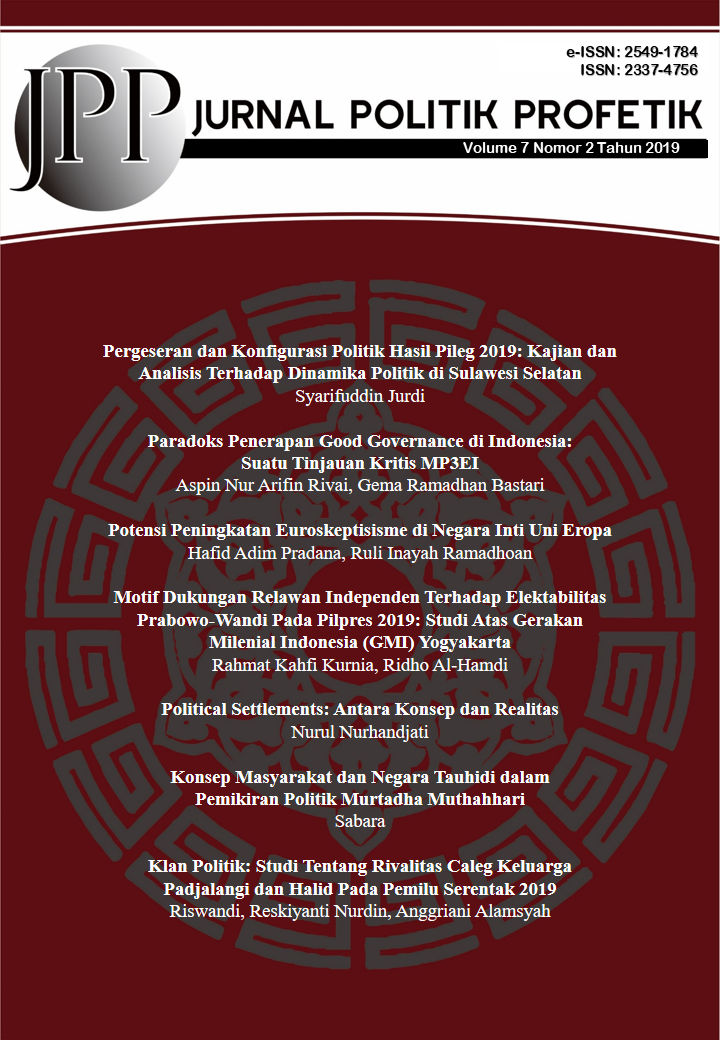POLITICAL SETTLEMENTS: ANTARA KONSEP DAN REALITAS
Abstract
Political Settlements are often identified with post-conflict conditions. Basically the main idea of political settlements is a shared understanding among the elites in the context of power distribution. Common understanding is interpreted as an agreement on the negotiations carried out, which is intended for the continuity of the overall system after the conflict. Thus the study of political settlements will show how the elites, both the formal elite and the informal elite, as well as other institutions in the community carry out strategies or strategies to establish legitimacy. The political agreement also negotiates the distribution of available resources. Thus the power relations that occur will restore the classic concept of power from Laswell namely Who Gets What, When and How, showing who has power in the agreement. As political agreements emerge as a strategy for cooperation rather than competition, in order to secure their interests, it takes days or even centuries, to be renewed continuously. Those who agree would continue to contest and are subject to renegotiation. The result would be new regulations or policies in the context of maintaining the status quo. Therefore, the political settlement framework did not state that the emergence of each policy reflects the balance of power in a country. Although in reality political agreement occurs in every political action, but in concept not many people use it in political analysis. This paper tried to describe the development of the concept of political agreement by examining the level of reality.
Downloads
References
Bell, Christine. “What We Talk About When We Talk About Political Settlements, Towards Inclusive and Open Political Settlements in an Era of Disillusionment”, dalam Political Settlements Research Programme: Working paper 1 (2015), h. 1-28.
Di John, Jonathan & James Putzel. “Political Settlements: Issues Paper” dalam Discussion Paper (2009), h. 1- 29.
Dudouet, Véronique & Stina Lundström. “Post-war Political Settlements: From Participatory Transition Process to Inclusive State-Building and Governance” dalam Berghof Foundation Research Report (2016).
Fritz, Verena & Alina Rocha Menocal, “Developmental States in the New Millennium: Concepts and Challenges for a New Aid Agenda” dalam Development Policy Review, 25, 5, (2007), h. 531-552.
Gutierrez, Eric. “Introducing Political Settlements” dalam Christian Aid’s Occasional paper, Number 3 (March, 2011), h. 1-23.
Ingram, Sue. “Political Settlements: The History of an Idea in Policy and Theory” dalam Discussion Paper 5 (2014), h. 1-16.
Kelsall, Tim. “Thinking and Working with Political Settlements” dalam Briefing papers (2016), h. 1-8.
Khan, Mushtaq H. “Political Settlements and the Governance of Growth-Enhancing Institutions” dalam Monographs and Working Papers (2010), h. 1-139.
Khan, Mushtaq H. “State Failure in Weak States: A Critique of New Institutional Economics” dalam J. Harris (ed.) The New Institutional Economics and Third World Development. London: Routledge, 2015.
Menocal, Alina R. Inclusive Political Settlements: Evidence, Gaps, and Challenges of Institutional Transformation. Birmingham, UK: International Development Department, University of Birmingham, 2015.
North, Douglass C., John Joseph Wallis and Barry R. Weinga















